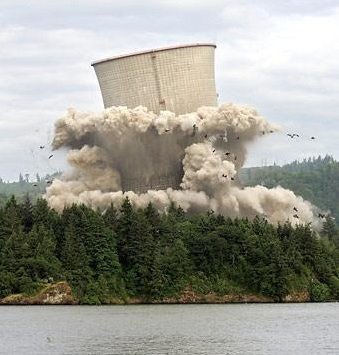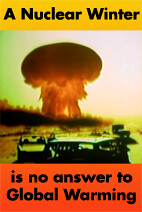Ziggy - you are wrong!

The cat's finally out of the bag: the ABC reports that the Howard government's review of uranium mining and nuclear power, under former Telstra chief Ziggy Switkowski, has found nuclear energy 'a practical option' for Australia. Hah! Wrong! Wrong! Wrong!
The big environmental groups came out fighting this morning, before the report's release, to reject the nuclear option because they anticipated the report's pro-nuclear stance very early on. Many believed that the inquiry was a forgone conclusion, considering what Howard's been saying up to now. And they were right.
Arguing that nuclear power could effectively deliver power to our grid in 10 to 15 years, the Switkowski report also talks up the contribution that nuclear processing and enrichment could make to the economy.
ABC Online has published an opinion piece by Ziggy Switkowski (is this part of the new 'anti-bias' editorial push in the ABC?) where he spruiks, and pre-emptively defends, his arguments in favour of expanding uranium mining, and introducing uranium enrichment and nuclear power in Australia. He tries to short-circuit his critics by arguing that nuclear power is safe:
Nuclear weapons proliferation is another issue of concern to the public. Increased Australian involvement in the nuclear fuel cycle would not change the risks. It is clandestine activity that is likely to lead to the production of nuclear weapons, not civil nuclear activities.Compare this to what Al Gore told The Age in an extensive interview in last Saturday's paper:
"For eight years when I was in the White House, every problem of weapons proliferation was connected to a reactor program."Gore also pointed to 'the problems of long-term waste storage, danger of operator error and vulnerability to terrorist attack' to show that nuclear is not a viable alternative.
Who are we going to believe? The man who helped run the largest nuclear power – in both military and domestic senses – in the world (no matter what we think of how well they did it or not), with access to the most extensive intelligence reporting available to any country?
Or a jumped-up corporate honcho who helped run a telecommunications company – into the ground in rural Australia (albeit whose claim to legitimacy on the nuclear issue is having a nuclear-physics PhD), and whose inquiry is seen by so many as a rubber stamp for Howard's neclear agenda?
The report indicates that nuclear power will be between 20 to 50 per cent more expensive than conventional power. How on earth does that make it viable?! Especially in light of what Gore says:
"And the uncertainty in the future of energy demand, especially when prices are rising, means that utility executives want to keep more of their options open; they don't want to bet their entire construction budget on the most expensive, largest increment that takes the longest time to build."But I think this finding illustrates what is potentially one of Howard's real purposes behind his apparent 'greenhouse coversion'. Dr Switkowski says nuclear energy would only be competitive in Australia if there were a recognised cost for greenhouse gas emissions. So, by Howard claiming to acknowledge the seriousness of global warming, he can now talk up the 'real' cost of coal-fired power production – in terms of CO2 emissions, not just dollars – in order to make the incredibly expensive nuclear alternative more pallatable to the public.
However, the extent of public antipathy towards nuclear power cannot be underestimated. Too many of us don't want nuclear power plants. This can be capitalised upon, however, by the government. When the dust settles after this report, and after the campaigns to oppose nuclear power, it is possible that expanding uranium mining and introducing nuclear enrichment to bulk out Australia's already resources-driven economy will be offered as the more pallatable options over nuclear power plants. (Not surprisingly, the mining industry has welcomed the report.)
Unfortunately, this taps in to the selfishness of the NIMBY (Not In My Back Yard) mentality in the Australian public: they don't mind if uranium is dug up, carted around, and nuclear waste stored, on Aboriginal land, dispossessing Aboriginal people and poisoning heritage listed places like Kakadu National Park in the process, but they don't want nuclear power stations or dumps in their neighbourhoods. Not surprisingly.
According to the ABC, the Federal Opposition Leader Kim Beazley has rejected the report's recommendations:
"That is one of the few things on which I can say in recent times I've absolutely agreed with George Bush - there should be no new uranium enrichment facilities anywhere."This is a promising start, but it's piss-weak considering Beazley's (and his supporters') support for reversing the ALP's Three Mines Policy limiting uranium mining.
We need more. Fare more, if we are to stop the Howard nuclear agenda. And we can't expect it from the federal ALP.
The only good thing in the inquiry's report is an acknowledgement that nuclear power will not be the panacea to global warming, and that other efforts to reduce carbon emissions from coal and gas will be required.
That is one are where we must focus - to discredit the bankrupt claims by nuclear's proponents that nuclear power can in any way offer a solution to global warming. But it is a start.
[Image from a photo by Sprol of the imploding cooling tower during the decommissioning of the Trojan nuclear power plant in US]
Labels: Australia, environment, global warming, nuclear power, politics










6 Comments:
A first impression:
* The Switkowski Report assumes that carbon fuels not consumed to provide electricity in Australia will not be consumed at all. This appears most unlikely, and the potential alternative uses for this carbon fuel (e.g. coal liquification to replace declining oil stocks) should therefore be factored in to the assessment.
* The Switkowski Report finds that an optimistic assessment of the costs of Nuclear Energy may be similar to the current costs of "clean coal". The Switkowski Report does not, however, give due consideration to the economic advantages of the potential sale/export of clean coal technology. This technology, as well as other renewable energy technologies, may be sold to any nation (unlike Nuclear technologies). The cost of clean coal and related technology may therefore be better categorised as an investment in Australia's trade performance.
* The Switkowski Report only counts clean coal emission savings for Australia. Clean Coal and Geosequestration Technology Exports to nations such as China and India could have a far greater impact on global carbon emissions than any reduction in Australia's emissions.
* Nuclear waste management costs appear to be at the optimistic end of the spectrum (unless trade in waste storage is viewed as an investment).
* Water availability will be a key constraint to Nuclear technology.
David
I happen to know that the coal washery at a NSW power station does not wash the coal - in fact, it is a huge shed with a convener that comes in and a belt that goes out and the coal is sprayed with water and dumped on the other belt so that it looks washed. It has been that way for 20 years.
I do not trust the electricity commission.
Very interesting post. And that photo is extraordinary.
Hi David, thanks for your comments - they've inspired a whole new post!
Also, I agree that water will be a big issue with nuclear power, but that could explain why its proponents argue that it can be twinned with desalination plants. Interestingly, many state governments – and state liberal oppositions – are pushing for desalination!
I don't know about washing coal, but from what's been said here, it sounds just like money laundering!
Tim, yes the photo is amazing. While I may wish I had taken it for its photographic (and illustrative) value, I didn't. And I wish there will never be nuclear power stations in Australia for me to photograph!
Not that the repressive security measures that would accompany their emergence in this country allow me to…!
I assume, in the interest of balance (see how pernicious the whole ABC-bias thing has become?), the ABC has published an opinion piece by ACF's anti-nuclear campaigner, Dave Sweeney, who is probably one of the best informed of the lot. It is a response to the Ziggy report.
This is a choice quote:
"The review also comprehensively fails to address the twin and unique problems of nuclear power: radioactive waste and the proliferation of nuclear weapons. No other power source has the potential to either illuminate or contaminate an entire city. On the other hand no despot has ever held the world to ransom with a solar panel."
Worth reading in total.
Nuclear waste can be dealt with in a number of ways. There are plenty of other industries, I'm sure, that produce large amounts of dangerous/toxic substances. Coal-fired power stations, for instance, emit more radiation than nuclear power plants! But the assumption in these other industries is that these toxic substances can be dealt with: logically, we should make the same assumption in the case of nuclear energy.
I'm sure that the proliferation of nuclear materials associated with nuclear power can be controlled in such a way that it remains in safe hands. (Absent from the Al Gore quote is any detail about *what* nuclear power plants, in what countries, the proliferation of nuclear weapons was associated with).
One easy solution to both problems: make sure the reactors in Australia are breeder reactors, which produce no leftover nuclear waste. Simple!
Post a Comment
<< Home